
Are is a monotypic moth genus in the subfamily Arctiinae erected by Francis Walker in 1855. The type species is Are druryi, which is found on Jamaica. This species was described by Dru Drury in 1773 under the name Phalaena marginata, but this name is preoccupied by Phalaena marginataLinnaeus, 1758 and a new specific epithet, honouring Drury, was assigned in 1986.
Clarkeophlebia is an enigmatic and almost-unknown gelechioid moth genus. It contains a single species, Clarkeophlebia argentea, and is apparently endemic to Fatu Hiva in the Marquesas Islands of Polynesia. It was originally described as Acanthophlebia, but this name had earlier been given to a genus of prong-gilled mayflies.

Sternotomis pulchra is a species of beetle belonging to the family Cerambycidae.

Orthomegas cinnamomeus is a species of beetle in the genus Orthomegas of the family Cerambycidae. It was described by Carl Linnaeus in his landmark 1758 10th edition of Systema Naturae. It is found in Hispaniola, Trinidad, Colombia, Venezuela, the Guianas, Brazil, Ecuador, Peru and Bolivia.

Archodontes is a genus of root-boring beetles in the family Cerambycidae. It is monotypic, being represented by the single species Archodontes melanopus. It is endemic to Central America and the south-eastern United States, and bores the roots of oaks and other hardwoods.
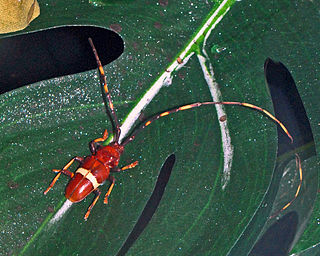
Trachyderes succinctus is a species of beetle in the family Cerambycidae. It was described by Carl Linnaeus in his landmark 1758 10th edition of Systema Naturae.

Trichura coarctata is a moth in the subfamily Arctiinae. It was described by Dru Drury in 1773. It is found in Brazil.
Eburia quadrimaculata is a species of beetle in the family Cerambycidae.

Elaphidion irroratum is a species of beetle in the family Cerambycidae. It was described by Carl Linnaeus in his 1767 12th edition of Systema Naturae.
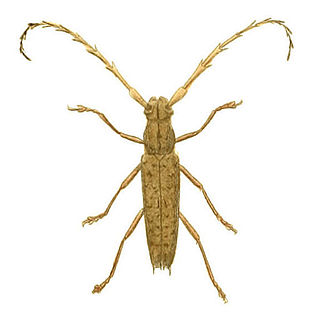
Elaphidion spinicorne is a species of beetle in the family Cerambycidae. It was described by Dru Drury in 1773 from Jamaica.
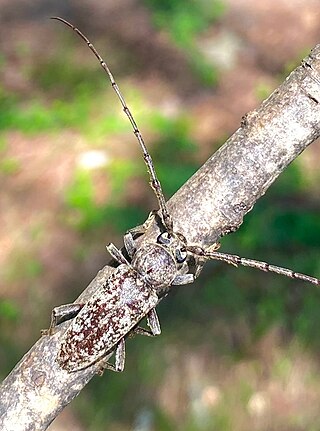
Enaphalodes atomarius, also known as the robust oak borer, is a species of beetle in the family Cerambycidae. It was described by Dru Drury in 1773 from New York City.

Steirastoma pustulata is a species of beetle in the family Cerambycidae. It was described by Dru Drury in 1773 from Jamaica.
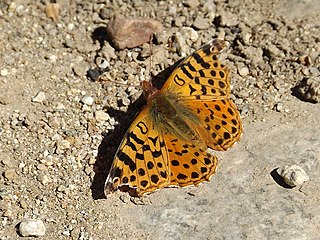
Yramea cytheris is a species of butterfly in the family Nymphalidae. It was first described by Dru Drury in 1773 from the Falkland Islands. In some systems it is included in genus Issoria.

Electrostrymon pan is a butterfly of the family Lycaenidae. It was described by Dru Drury in 1773 from Jamaica.

Sternotomis mirabilis is a genus of long-horned beetle belonging to the family Cerambycidae. It was first described in 1773 by Dru Drury from Sierra Leone.

Prosopocera bipunctata is a species of flat-faced longhorn beetles in the subfamily Lamiinae. It was first described by Dru Drury in 1773, from Sierra Leone.
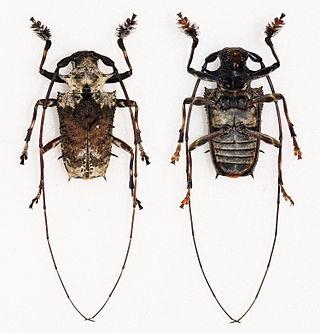
Polyrhaphis spinosa is a species of longhorn beetles of the subfamily Lamiinae. It was first described by Dru Drury in 1773.

Gaeana maculata is the type species of cicadas in the genus Gaeana. It was first described by Dru Drury in 1773, from China.
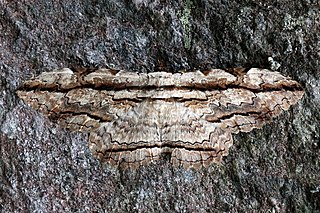
Thysania zenobia, the owl moth, is a species of moth in the family Erebidae. The species was first described by Pieter Cramer in 1776, and is native to North and South America and the Caribbean.

Lachlathetes gigas is a species of antlions in the subfamily Palparinae. It is native to Gabon, Guinea and Sierra Leone. The species was named by Dalman in 1823, based on an insect figured by Dru Drury as a variety of Myrmeleon libelluloides.


















